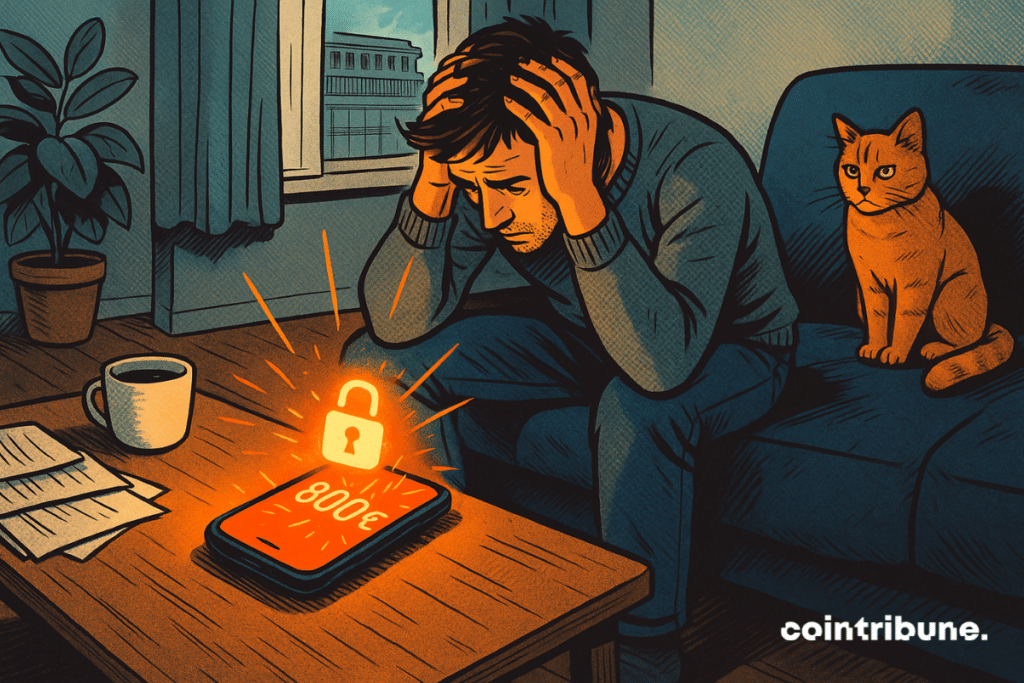10h05 ▪
4
min read ▪ by
At a time when financial distrust spreads with a click, a TikTok video posted at the end of May reignited fears of increased state control. It claims that from October 2025, any transfer over 800 euros between individuals would be blocked for 24 hours for tax verification. Within a few days, the rumor caused unrest among thousands of French people. What does the regulation really say? And why is this viral announcement completely unfounded?

In Brief
A viral TikTok rumor claims that transfers over €800 will be automatically blocked starting October 2025.
The video, widely shared on social media, falsely cites Bercy and some media to support its claims.
The Ministry of Economy and the French Banking Federation have formally denied this allegation to AFP.
In fact, a banking reform will come into effect on October 9, 2025, but it only concerns IBAN/name matching verification.
When TikTok Sows Doubt About Bank Transfers
In April, a TikTok video announcing the imminent end of cash in France made a big impact on social media. Along the same lines, another viral video began to spread widely on May 26, 2025, claiming that a new system planned for October 2025 will block transfers between individuals exceeding 800 euros for 24 hours.
The post, widely shared on TikTok, Instagram and Facebook, claims in particular that :
“Any transfer over €800 between individuals will be temporarily blocked for 24 hours”, regardless of its nature (purchase, loan, repayment) ;
The blockage would concern transfers between friends, relatives, or private individuals ;
The delay is intended to allow verification by an automated system linked to the tax administration ;
This measure is said to be based on official announcements from Bercy and some media.
The frenzy around this video was immediate. Some internet users mentioned an infringement on individual liberty, others denounced a “generalized tax surveillance”, even calling France a “dictatorship”.
In response, the Ministry of Economy formally denied the allegations. In a statement sent to AFP, it clarifies :
This allegation is misleading. To date, no law or decree provides for an automatic blocking threshold at 800 euros or a 24-hour suspension. Therefore, this rumor is based on a misinterpretation of reality, probably fueled by confusion with a distinct measure.
A Strengthened Authentication System, Not Generalized Surveillance
Contrary to the rumor circulating, a real banking reform will come into effect starting October 9, 2025, but it neither involves a capped amount of €800 nor an automatic 24-hour suspension, nor a systematic tax administration check.
This reform simply aims to verify the match between the information provided by the transfer sender and the IBAN of the recipient, to better secure transactions. It is a system designed to “inform the customer of the match between the information provided at the time of the transfer request and the IBAN”.
This measure fits within the framework of a European regulation passed in 2024, which mandates the generalisation of instant bank transfers in the SEPA area while strengthening the fight against fraud.
Banks will thus have the mission to prevent errors or scam attempts by reporting possible discrepancies between the beneficiary’s name and their IBAN, without automatically blocking the operation or imposing a legal 24-hour waiting period. No transaction suspension is planned at this stage, neither under French law nor European regulation.
In response to this tightening control of traditional bank transfers, some voices in the digital ecosystem highlight the increased interest in cryptocurrencies, particularly bitcoin. As a decentralized payment system without a banking intermediary, bitcoin allows direct transfers without the need for validation by a central institution or the obligation of correspondence between a name and a wallet address.
Ultimately, this evolution could encourage banking platforms to adapt their upstream verification systems, but this does not in any way signify the establishment of automated tax control on transfers between individuals, specifically external transfers.
Maximize your Cointribune experience with our “Read to Earn” program! For every article you read, earn points and access exclusive rewards. Sign up now and start earning benefits.
Diplômé de Sciences Po Toulouse et titulaire d’une certification consultant blockchain délivrée par Alyra, j’ai rejoint l’aventure Cointribune en 2019.
Convaincu du potentiel de la blockchain pour transformer de nombreux secteurs de l’économie, j’ai pris l’engagement de sensibiliser et d’informer le grand public sur cet écosystème en constante évolution. Mon objectif est de permettre à chacun de mieux comprendre la blockchain et de saisir les opportunités qu’elle offre. Je m’efforce chaque jour de fournir une analyse objective de l’actualité, de décrypter les tendances du marché, de relayer les dernières innovations technologiques et de mettre en perspective les enjeux économiques et sociétaux de cette révolution en marche.
DISCLAIMER
The views, thoughts, and opinions expressed in this article belong solely to the author, and should not be taken as investment advice. Do your own research before taking any investment decisions.




